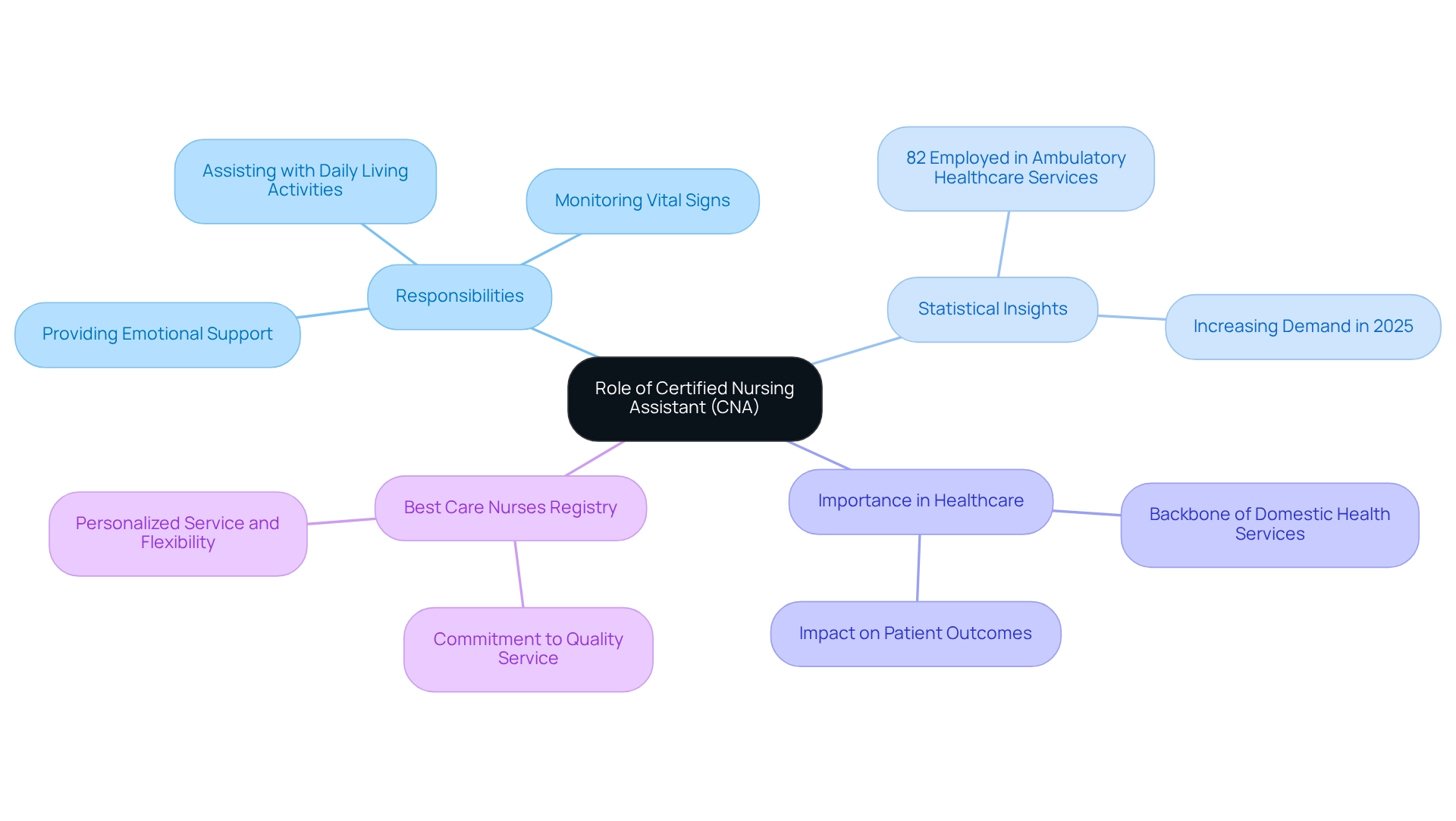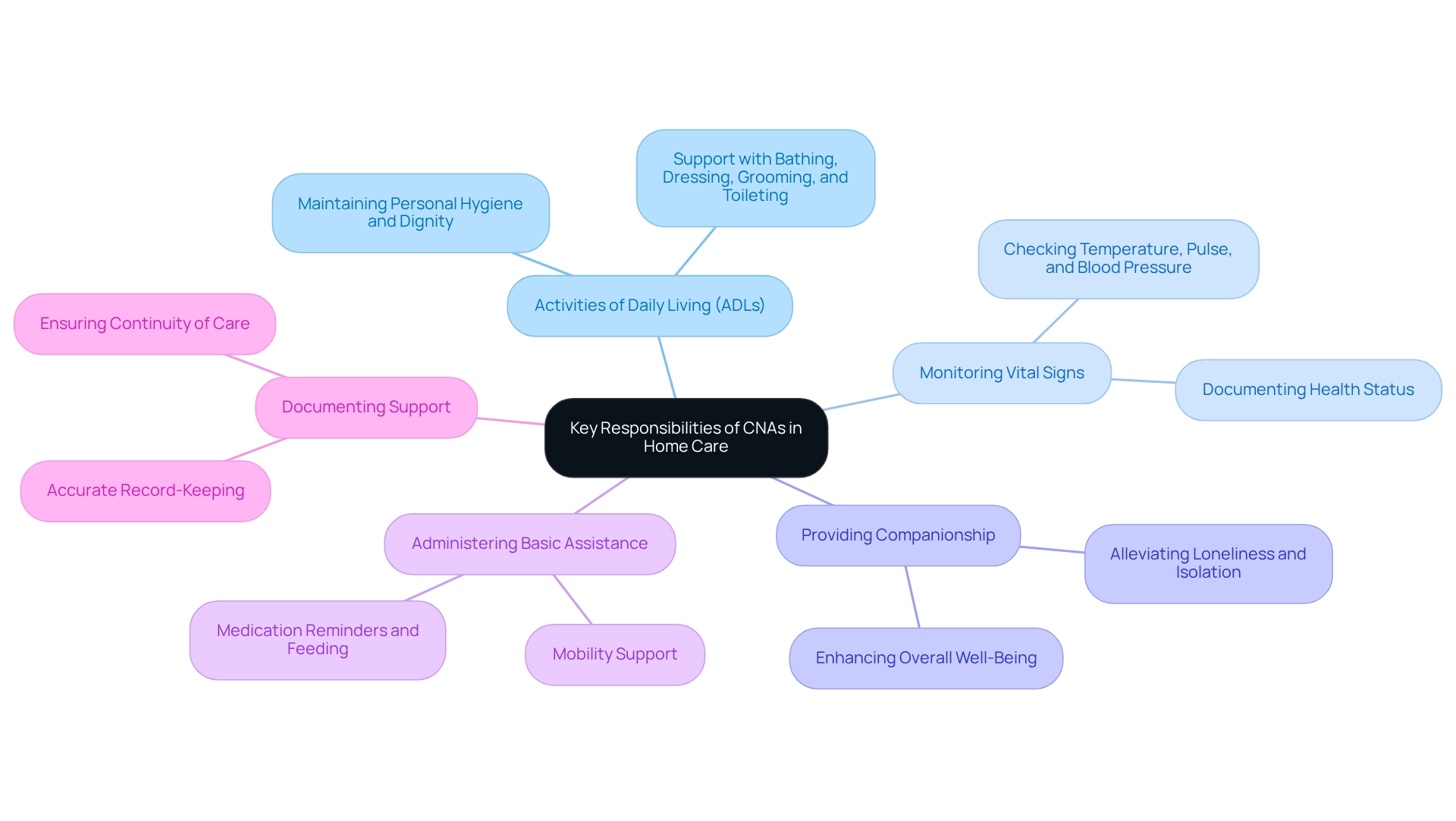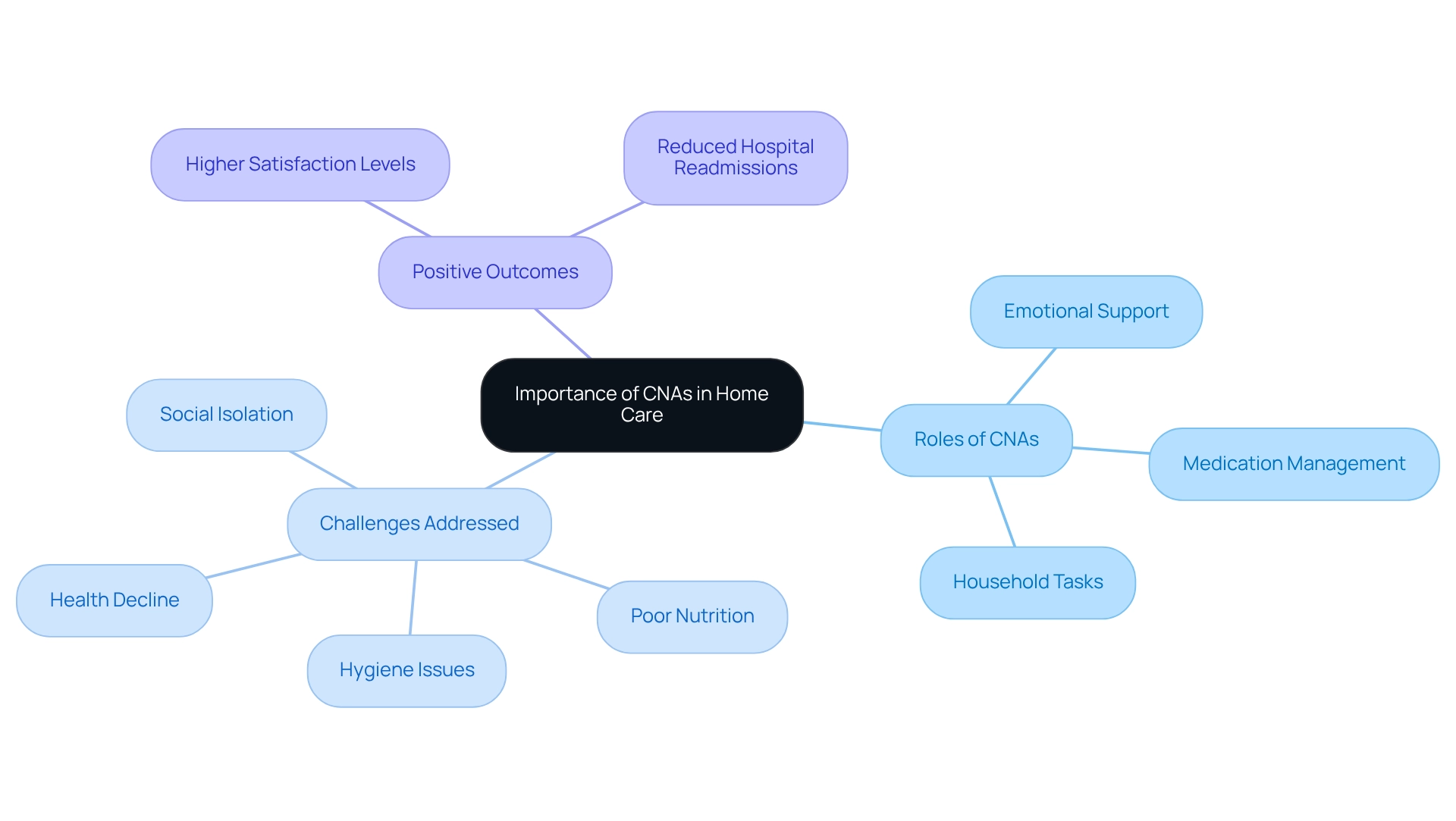Overview
The role of a Certified Nursing Assistant (CNA) in home care is truly vital. They provide essential support with daily living activities, monitor vital signs, and offer emotional companionship to individuals in residential settings. This compassionate care enhances patient well-being and satisfaction, while also significantly reducing health complications.
It’s clear that CNAs play an indispensable role in maintaining quality care in home environments. Your loved ones deserve this level of attention and support, and we’re here to ensure they receive it.
Introduction
In the evolving landscape of healthcare, Certified Nursing Assistants (CNAs) serve as vital pillars of support, especially in home care settings where personalized attention is paramount. These dedicated professionals not only assist with daily living activities but also provide essential emotional support, ensuring that patients receive compassionate care in the comfort of their own homes.
As the demand for home health services continues to rise, the role of CNAs becomes increasingly significant. Their contributions directly impact patient outcomes and overall well-being. This article explores the multifaceted responsibilities of CNAs, their indispensable role in enhancing patient quality of life, and the rigorous training required to equip them for this critical profession.
We understand that navigating healthcare can be overwhelming, but know that you are not alone. CNAs are here for you, committed to providing the care and support you deserve.
Defining the Role of a Certified Nursing Assistant (CNA)
A Certified Nursing Assistant (CNA) at home care plays a vital role in providing compassionate assistance to individuals in residential settings. These dedicated healthcare professionals help with daily living activities such as bathing, dressing, grooming, and feeding, while also monitoring vital signs and reporting any changes to nursing staff. Their involvement is essential in ensuring that patients receive empathetic and skilled support, particularly in home environments where CNA at home care provides the individualized attention that is crucial.
In 2025, the need for nursing assistants in residential health services continues to rise. A substantial number of nursing assistants are actively working in this field. Notably, 82% of orderlies are employed in ambulatory healthcare services, highlighting the increasing reliance on home assistance as families strive to offer their loved ones quality support in familiar surroundings. The certification process for nursing assistants typically involves completing a state-recognized training course and passing a competency examination, ensuring they possess the necessary skills to provide high-quality care.
The significance of nursing assistants in healthcare cannot be overstated. They serve as the backbone of domestic health services, offering not only physical assistance but also emotional support to individuals and their families. As Josh Ternyak notes, ‘Certified Nursing Assistants are frequently hired in hospitals, nursing homes, assisted living facilities, and CNA at home care settings.’ Their presence can profoundly impact patient outcomes, enhancing the overall quality of CNA at home care services provided. As the healthcare landscape evolves, the role of nursing assistants remains critical, with their contributions recognized as essential to the success of residential health services.
Best Care Nurses Registry exemplifies this commitment to quality service by employing certified nursing assistants and home health aides who are thoroughly screened and matched with clients to foster trust and comfort. This personalized approach, coupled with flexible service options, positions Best Care as a leader in the residential health sector, appealing to families seeking exceptional support for their loved ones. The firm’s competitive edge lies in its dedication to ensuring that nursing assistants are supported in their roles, ultimately enhancing the quality of service delivered.

Key Responsibilities of CNAs in Home Care
Cna at home care can play a vital role in ensuring individual comfort and safety through their dedicated efforts. Their primary duties encompass several essential areas:
- Helping with Activities of Daily Living (ADLs): Certified Nursing Assistants provide crucial support with bathing, dressing, grooming, and toileting. This assistance helps individuals maintain their personal hygiene and dignity. In fact, around 80% of nursing assistants’ time is devoted to these daily living activities, underscoring their importance in care.
- Monitoring Vital Signs: A fundamental responsibility of nursing aides is the consistent checking and documentation of vital signs, including temperature, pulse, and blood pressure. This monitoring is essential, as it provides healthcare providers with vital information regarding the individual’s health status.
- Providing Companionship: Emotional support is a significant aspect of a CNA’s role. By spending meaningful time with individuals, certified nursing assistants help alleviate feelings of loneliness and isolation, enhancing the overall well-being of those they care for. This companionship is especially important for older adults, as the absence of support can lead to social isolation, potentially resulting in depression and anxiety.
- Administering Basic Assistance: Certified nursing assistants also assist with medication reminders, feeding, and mobility support, ensuring individuals adhere to their treatment plans. This fundamental support is crucial for maintaining the health and autonomy of individuals receiving assistance at home, particularly those managing chronic conditions or recovering from surgeries.
- Documenting Support: Accurate record-keeping is vital for ensuring continuity and quality of care. CNAs at home care document the assistance provided, enabling other healthcare professionals to stay informed about the patient’s condition and any changes that may arise.
If you are considering whether an elderly family member may benefit from CNA at home care or home health aide services, look for signs such as difficulties with personal hygiene, dressing, cooking, cleaning, or managing medications. Health issues, including chronic conditions, frequent hospitalizations, or recent surgeries requiring ongoing support, are also critical factors to consider. In 2020, the long-term support sector saw approximately $475.1 billion spent on services, with a significant portion allocated for personal assistance. This highlights the essential role of nursing aides in the context of CNA at home care. As the demand for home assistance continues to rise, with an expected 216,200 openings for CNAs annually over the next ten years, their responsibilities will remain crucial in ensuring individuals receive the compassionate and proficient support they need. This increasing demand is further illustrated by the financial realities of extended support, where out-of-pocket expenditures account for a notable portion of income, comprising 13.5% of overall long-term support spending, as noted by Claire Samuels.
Moreover, CNA training programs typically include both classroom instruction and practical experience, equipping them with the necessary skills to effectively address the challenges of healthcare. Understanding the financial landscape of extended support, along with insights from case studies on funding, emphasizes the importance of nursing assistants in assisting individuals and families as they navigate these challenges. It is also important to note that while nursing assistants focus on medical tasks, Home Health Aides (HHAs) primarily provide support with personal assistance and daily living activities.

The Importance of CNAs in Supporting Patient Well-Being
CNA at home care professionals play a vital role in enhancing the overall health of individuals in home support environments. Their responsibilities go beyond physical assistance; they provide essential emotional support and companionship, which are crucial for mental well-being. By building trusting relationships, caregivers provide cna at home care that creates a nurturing atmosphere promoting autonomy and significantly improving quality of life, while also addressing challenges such as:
- Health decline from insufficient medical monitoring
- Poor nutrition due to inadequate meal preparation
- Hygiene issues leading to infections
- Heightened risks of social isolation and household hazards
Studies indicate that individuals receiving regular help from cna at home care report higher satisfaction levels and better health outcomes. For instance, residential healthcare provided through cna at home care has been shown to reduce hospital readmissions, highlighting the importance of committed caregivers who can detect changes in an individual’s condition and facilitate timely interventions. In addition, certified nursing assistants assist with medication management and household tasks, ensuring a safe and organized living environment. This proactive approach not only prevents complications but also enhances the overall experience for individuals, making cna at home care indispensable in the health services field.
At Best Care Nurses Registry, we have been devoted to providing personalized home health services in South Florida since 1980. We understand that your comfort is our priority, and we are here to ensure that our clients receive the highest quality of support tailored to their unique needs. Your peace of mind matters to us, and we are committed to being there for you every step of the way.

Qualifications and Training for CNAs
To become a Certified Nursing Assistant (CNA), individuals must meet certain educational and training prerequisites, which generally encompass:
- High School Diploma or GED: This is the essential educational requirement for admission into CNA programs.
- Completion of a State-Approved Training Program: These programs integrate classroom instruction with practical clinical training, addressing crucial topics such as patient support, safety protocols, and effective communication skills. In Georgia, for example, candidates must successfully finish a board-approved nursing assistant program and pass the NNAAP exam for certification.
- Passing the Certification Exam: After completing the training, candidates must successfully pass a state certification exam that evaluates both their theoretical knowledge and practical skills.
- Ongoing Education: Many states require that nursing assistants complete continuing education courses to maintain their certification, ensuring they stay informed about best practices and regulatory updates. This commitment to continual learning highlights the elevated expectations of service in the home health industry, especially in CNA at home care, where the crucial functions of certified nursing assistants go further than fundamental support and greatly improve seniors’ health and quality of life. By offering customized assistance suited to personal requirements, CNA at home care helps sustain the independence and dignity of seniors. They assist with personal hygiene, meal preparation, and medication management, which are crucial for preventing health decline and ensuring overall well-being. Without CNA at home care services, seniors may encounter serious issues such as health decline, poor nutrition, and social isolation, leading to further complications. Additionally, CNA at home care providers offer emotional support and companionship, helping to alleviate feelings of isolation and sadness, which are crucial for mental well-being. The median annual wage for nursing assistants was reported at $39,530 in May 2024, reflecting the value of this profession. Moreover, effective communication, compassion, patience, and physical stamina are vital abilities for nursing assistants, allowing them to deliver high-quality assistance and support to patients. As the demand for orderlies is expected to hit 52,200 by 2033, the significance of well-trained CNA at home care services keeps increasing, emphasizing the necessity for thorough training and qualifications to fulfill this demand. At Best Care Nurses Registry, a family-owned home health care provider, we emphasize the significance of CNA at home care qualifications in delivering personalized care to our clients. We’re here for you, ensuring that your comfort and well-being are our top priorities.

Conclusion
Certified Nursing Assistants (CNAs) play a vital role in home care, enhancing the quality of life for patients through their multifaceted contributions. They assist with daily living activities, monitor vital signs, and provide emotional support—each element essential for improving health outcomes. By fostering companionship and addressing both physical and emotional needs, CNAs help alleviate feelings of loneliness, particularly among seniors.
The growing demand for home health services highlights the crucial role CNAs play in delivering compassionate care. Their skills not only promote independence but also ensure that patients receive the dignity and support they deserve during challenging times.
With comprehensive training and ongoing education, CNAs are well-equipped to navigate the complexities of patient care. This dedication to professional growth ensures they remain effective as the healthcare landscape evolves.
In conclusion, CNAs are indispensable to home health care, significantly impacting patient outcomes and overall well-being. As families increasingly seek personalized care in home environments, the invaluable contributions of CNAs will continue to be recognized and cherished within the healthcare system. Remember, we’re here for you, and your comfort is our priority.
Frequently Asked Questions
What is the role of a Certified Nursing Assistant (CNA) in home care?
A Certified Nursing Assistant (CNA) in home care provides compassionate assistance with daily living activities such as bathing, dressing, grooming, and feeding. They also monitor vital signs and report any changes to nursing staff, ensuring patients receive empathetic and skilled support.
Why is the need for nursing assistants increasing in residential health services?
The need for nursing assistants is rising due to the increasing reliance on home assistance, as families aim to provide quality support to their loved ones in familiar surroundings. In 2025, a substantial number of nursing assistants are actively working in this field.
What percentage of orderlies are employed in ambulatory healthcare services?
Notably, 82% of orderlies are employed in ambulatory healthcare services, highlighting the demand for nursing assistants in home care settings.
What is involved in the certification process for nursing assistants?
The certification process for nursing assistants typically involves completing a state-recognized training course and passing a competency examination to ensure they possess the necessary skills for high-quality care.
What impact do nursing assistants have on patient outcomes?
Nursing assistants significantly impact patient outcomes by providing both physical assistance and emotional support, which enhances the overall quality of care in residential health services.
Where are Certified Nursing Assistants frequently hired?
Certified Nursing Assistants are frequently hired in hospitals, nursing homes, assisted living facilities, and home care settings.
How does Best Care Nurses Registry ensure quality service?
Best Care Nurses Registry employs certified nursing assistants and home health aides who are thoroughly screened and matched with clients, fostering trust and comfort, and enhancing the quality of service delivered.











